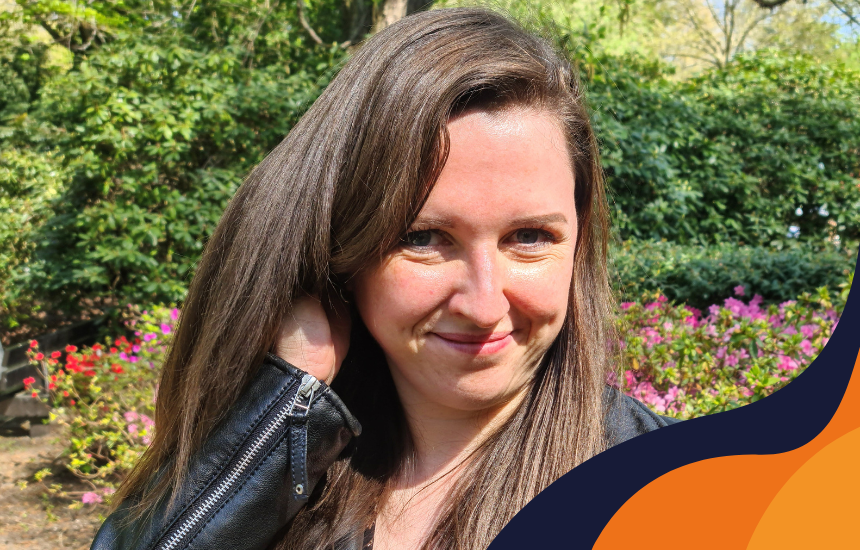
Level Up Academy: Tell us something about yourself; how did your journey with the Dutch language start?
Monika Mączka: My journey with the Dutch language began by accident. The human sciences have always been closer to my area of interests, but I have always found learning languages quite easy. After graduating from high school, I planned to start linguistic studies, but I couldn’t decide on the language – I was conflicted between Scandinavian studies, English studies and Bohemian studies, i.e., Czech philology.
I especially dreamed of learning Icelandic; I’m a fantasy fan, and this language reminded me of the language created by Tolkien. Ultimately, I chose the Dutch language, although it certainly does not compare to the language of the elves! It actually more resembles the swamp whirr of orcs. 😉 Dutch studies seemed exotic and niche to me. It’s also important to remember that a decade ago the Polish labor market for graduates was fast developing. I decided to study in my hometown, Lublin, at the Catholic University of Lublin. In addition to Dutch philology, I also graduated from Editing.
How did you end up in the Netherlands?
Monika: After graduating from both faculties in 2017, I started my first serious job as an export manager using the Dutch language, which gave me the opportunity to regularly travel to the Netherlands and Belgium for business. After a few such visits, my partner and I decided to try our hand abroad. First, I lived for a while in Antwerp, Belgium but without knowing French it was difficult to find a suitable job.
After many adventures trying to find accommodation in the Netherlands – the Dutch real estate market is sometimes merciless – I finally managed to settle in Aalsmeer, a picturesque town located next to Amsterdam. This is where I’ve been living for over three years. Every day I see the inhabitants of Aalsmeer taking their horses for walks, in the morning I hear the clucking of hens, and every spring I enjoy the sight of blooming flowers – it’s a completely different lifestyle and the dynamics of life are incomparable to what I was used to in a larger city.
Do you think Polish and Dutch customs are very different? Was there anything that surprised you in the Netherlands?
Monika: Certainly, you can pinpoint differences in every culture, every nation, there are always different customs. It is no different when comparing the Poles and the Dutch. What surprised me the most at the very beginning of my Dutch adventure was the general kindness, the smiles and highly personal culture of the Dutch. Poles often have a poker face, they do not show much positive emotion, especially when interacting with strangers. If you smile on the street in Poland, you stand out from the crowd, not always in a good way. The Dutch like to greet passers-by, comment positively on what you are doing, for example, if you are working in your garden. More than once I have heard the phrase lekker bezig when I was doing something in front of the house on a sunny day. I am very charmed by it. Poles, as well as the Dutch, appreciate a job well done and commitment to the tasks performed.
What also surprised me in the Netherlands was the open windows in every house and the lack of fences – in this aspect we are definitely different! Poles cover their windows with layers of curtains, they separate themselves from each other with the highest of fences. In the Netherlands, on the contrary, you can see every interior through the windows; the Dutch have nothing to hide. This is due to the fact that many Dutch are Protestants, often Calvinists. Within this belief, the exemplary citizen is transparent, openly demonstrating he does not have anything to hide. Even when there are fences around Dutch houses, the gates remain open.
I also really like the celebration of age in the Netherlands. Older residents are happy with another birthday, ‘round birthdays’ are always celebrated well. Birthday guests’ houses are decorated with inflatable figures and the age is openly stated. In Poland, we do not celebrate becoming a senior, people forget about old age in our country or do not want to remember. Dutch pensioners are role models when it comes to an active lifestyle and cheerfulness.
It's true, we can certainly learn from the Dutch with a smile on our face and a positive attitude. What do your online Dutch lessons look like?
Monika: During lessons, I try to keep a relaxed atmosphere, I like to joke and keep a dynamic pace. I’m certainly not boring, although I imagine that not everyone is fond of grammar. I want my students to feel good and comfortable during my classes, so they are not ashamed to speak or make mistakes. We all make mistakes, and learning a foreign language is really a constant juggling of mistakes.
I believe that everyone is able to learn a language, but in order to do so, you need to get to know yourself a bit and find which learning methods suit you. You need to discover whether you are an auditory learner, or whether you prefer to learn the language through movement, interaction with others, by watching movies or through traditional learning with a textbook or with auxiliary apps etc. I find it’s best to combine all these methods, and add some fun and lightness to the learning process.

How can students keep the desire to learn a language at a high level? Do you have any proven methods?
Monika: Diversify your studies and impose discipline. Motivation is just getting the engine started; you have to consciously work on the rest to reach your goal. Turning to Dutch music, films and literature helped me. It is better to spend a few minutes at a time regularly than to sit for 2-3 hours at a time with books every now and again – try to arouse your language curiosity regularly in short dedicated bursts. Importantly, you should also think about the goal you want to achieve. Ask yourself: Why do I want to learn this language? Do I want to be able to write efficiently or just to get along on a daily basis? Setting a goal always helps you embrace the right strategy for action.
Watching TV or children’s programs is a great help in learning a foreign language, not only Dutch. When you have the option of adding subtitles, you are already in a winning position, because not only do you listen to the language, but your eyes immediately see the spoken words too, a win-win situation for learners.
Certainly, having Dutch friends also helps, they will introduce you to the language outside of the books, the slang or everyday phrases that are currently popular with young people, or refer to works of culture that have settled in the spoken language.
Do you have any advice for people wanting to learn Dutch? How to motivate yourself to study?
Monika: In moments when we simply don’t want to, think about why we do it. Remember that goal. Ask for support from a loved one or another person who is learning, somone who can cheer you on. Learning a language sometimes takes its toll, there may be a few weeks when you do not feel progress, and instead feel frustration. Wait these critical moments out, take a break, give yourself time. These are the jump points on the so-called learning curve. Usually, after such lows, you quickly realise how much progress you have made in learning, and suddenly you understand much more than you thought, you recover and feel enlightened. For sure, showing yourself some understanding will help, don’t push yourself so much with thoughts that you should already be able to do this or that. Learning takes time and commitment; you can’t cheat here.
Certainly, for many students, a fantastic motivation is the desire to improve their lives, i.e., to find a more satisfying and better-paid job. People with families, especially children who go to school in the Netherlands, have a need to communicate with the other children and teachers, which also adds energy and enthusiasm to learning.
Follow this link to find more similar articles.
Open enrollment: Check our group courses for the current course schedule. Sign up for our courses.
